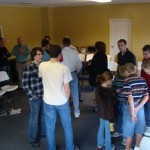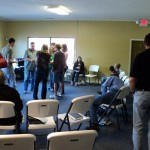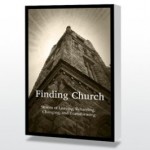The accidental organic/simple church
A few years ago, my family was part of a group of believers who decided to leave one church organization in order to form another church organization. That new church organization became “Messiah Baptist Church.” We were a typical Southern Baptist group, many of us with ties to a local Southern Baptist seminary.
A few things happened in those early days that influenced what happened in the coming years.
First, several of us were interested in ecclesiology (the study of the church). Second, almost all of us held a high view of Scripture and desired to compare everything that we believed and did to Scripture. Third, we did not have a place to meet throughout the week, so we rented a community center on Sunday and met in homes during week for Bible studies. Fourth, we decided to eat together regularly – every week at first, and then at least once per month. Finally, we were a small, poor group so we could not afford to pay someone to be our “pastor” and to preach every week.
Like most new church organization, we began with a set of bylaws, church membership covenant, and a leadership team (since we couldn’t afford to pay one person). We met on Sundays for a “worship service,” complete with a band and a sermon (with different people – primarily one of the chosen leaders – preaching each week). We had several home-based “Bible studies” since we could not do Sunday school in our Sunday meeting location. (By the way, these Bible studies became the medium through which we built very strong relationships with each other.)
As I said, we desired to compare everything that we believe and did according to Scripture, and over the next few years many, many things changed. The primary thing that changed is how we thought of ourselves and our relationships with God and with one another. Gradually, the focus on the organization faded, and relationships became much more important.
Of course, everyone did not appreciate these changes, and preferred “church as we know it” – as it’s been called. Interestingly, several of us remain connected with those who no longer meet with us because of those disagreement about the church… and we continue to serve them whenever we can.
Today, we continue to gather weekly. But, our gathering are much more interactive and teaching is primarily through discussion and dialog. We do not have a band or even a planned set of songs that we sing each week. We sing if someone has a song they would like to sing. We often gather in each other’s homes, at the park, at the beach, anywhere and for almost any reason. We share our lives with one another, and still easily welcome new people we meet.
As people move away from our area, we often find that we’re able to stay in contact with one another because of the relationships that we’ve built. (Of course, this doesn’t happen with everyone who moves away.)
In many ways, we still have aspects of traditional church organization, especially when we gather on Sunday mornings. On the other hand, we also have many aspects of simple/organic churches. (This is why I often say that we’re a “hybrid.”)
In fact, many people who prefer more organized church think that we’re not structured enough. People who prefer more simple/organic type church life often think that we’re too organized. (And, I like it that way… )
We did not set out to start an “organic church” or “simple church.” If you asked many of the people who we gather with regularly, they would probably not even know the phrases “organic church” or “simple church.”
Instead, we are simply a group of followers of Jesus Christ who are at a certain state in our life with God and our lives with one another and continue to seek to help one another group in maturity in Jesus Christ.
I would not recommend that other groups take that same journey that we take or seek to be at the same point we’re currently at. So, what do I recommend? Exactly what I said above: be a group of followers of Jesus Christ who are at a certain state in your life with God and your lives with one another and continue to seek to help one another group in maturity in Jesus Christ.
Where are the organic/simple church people hiding?
Last year, two of my most read posts were “People want real examples of organic church life” and “Why is it so difficult to find organic church life?”
In those posts, I talked about how people are tired of theory and simply talking about organic/simple church. But, when they look for real, living examples of these groups of Christians, they often can’t find them. There are many reasons for that, beginning with the fact that most groups are not incorporated, they don’t advertise/market, they don’t have a big, flashing sign with a cute saying, etc.
So, if someone wants to meet others who are interested in this different kind of “church life,” what should they do?
Now, Nathan at “Joined to Him” has written a very good post called “7 Tips on How To Find Organic Church Life.”
After a brief introduction, he offers these seven tips:
1. Pray, pray, and pray some more.
2. Join Facebook Groups dedicated to Organic Church Networking.
3. Follow up on potential leads.
4. Start a blog and talk about your journey and desire for organic church community.
5. Start small and trust the Lord.
6. Move to a new location.
7. Lower your expectations.
(Please take the time to read Nathan’s post. He explains and gives examples for each of his seven tips.)
What do you think about Nathan’s tips? What would you add, remove, or modify?
Amazed at living in the last days
Before you start reading this post, I need to clarify something. When I use the phrase “the last days” in this post, I’m not using it in the manner that it’s often used by those who love to study and discuss eschatology – that is, that time just before the world comes to an end.
Instead, when I use the phrase “the last days” in this post, I’m using it in the manner that Peter used it in Acts 2, when he quoted the prophet Joel: “And in the last days it shall be, God declares, that I will pour out my Spirit on all flesh, and your sons and your daughters shall prophesy, and your young men shall see visions, and your old men shall dream dreams…” (Acts 2:17 ESV; Joel 2:28)
This reference to “last days” is often found in the Old Testament (such as that passage in Joel). This was a time that the people of the Old Testament longed for. They looked forward to the time when God would be with his people (“Immanuel”), when God would give them a new heart, and when they would live under a new covenant.
Here’s the thing… if Peter is correct (and I think he is), then he saw himself and those of his generation as living in “the last days,” and I would say that we still live in “the last days.”
The difference is, for the authors of the New Testament, there was an excitement – an amazement – a wonder – at living in “the last days.” I already mentioned what Peter said about “the last days” on the day of Pentecost. Now, consider these passages also:
When you read this, you can perceive my insight into the mystery of Christ, which was not made known to the sons of men in other generations as it has now been revealed to his holy apostles and prophets by the Spirit. This mystery is that the Gentiles are fellow heirs, members of the same body, and partakers of the promise in Christ Jesus through the gospel. (Ephesians 3:4-6 ESV)
Concerning this salvation, the prophets who prophesied about the grace that was to be yours searched and inquired carefully, inquiring what person or time the Spirit of Christ in them was indicating when he predicted the sufferings of Christ and the subsequent glories. It was revealed to them that they were serving not themselves but you, in the things that have now been announced to you through those who preached the good news to you by the Holy Spirit sent from heaven, things into which angels long to look. (1 Peter 1:10-12 ESV)
Paul and Peter both recognize that they were living in an exciting time – a time that others wondered about and look forward to. It was in their time (and our time) when God was demonstrating his grace to all peoples – even the Gentiles. Now, they (and we) know how God is with his people.
I started thinking about this recently when we were studying Romans 1 together with the church. There, in the opening address, Paul refers to this same idea of living in “the last days”:
Paul, a servant of Christ Jesus, called to be an apostle, set apart for the gospel of God, which he promised beforehand through his prophets in the holy Scriptures, concerning his Son, who was descended from David according to the flesh and was declared to be the Son of God in power according to the Spirit of holiness by his resurrection from the dead, Jesus Christ our Lord… (Romans 1:1-4 ESV)
Paul recognized that he and his readers were living out the promises that God had made generations before. And, he was amazed at this fact.
May we never lose the wonder and amazement at living during a time when God is with his people, indwelling us by his Holy Spirit.
Living as one who is sent by God… wherever you are
Typically, when we gather together on Sunday mornings with our brothers and sisters in Christ, we have a plan to study through a certain section of Scripture together. We usually discuss an entire book together; so each week we know which chapter we’ll be studying that week. (When we gather together at other times during the week, we rarely have that same kind of plan.)
For the last few weeks, we’ve decided not to study through a book. We’re not setting that aside completely, because it has been very valuable for us. (In fact, we plan to start studying another book of Scripture together in a couple of weeks.) But, for now, we’re not discussing a particular passage of Scripture together.
However, when we came together last Sunday, God definitely had an agenda for us… but not an agenda that any of us planned. It turned out that as we asked for prayer for people whom God had brought into our lives over the last few weeks, a pattern emerged. We were all asking for prayer for people at different places in their walk with Christ – some of them were not following Jesus at all – and God was using us in different ways in the lives of these people.
We began to talk about how God was showing us how important it was for us to live intentionally as those he had sent into the world. Yes, it’s very important that we gather together and build each other up (the point of this blog, by the way). But, the “gathering up” suggests dispersal, and the “building up” suggests that we’re being prepared for something. In fact, we’re seeing more and more that God is sending us out to proclaim the good news of Jesus Christ and to help others follow him with us. (When I say, “With us,” I don’t necessarily mean meeting with us on Sundays or at other times. I mean we are helping others follow Jesus as we follow him also.)
Someone mentioned a neighbor. Someone else talked about a coworker. Someone met a person in the grocery store. There were different people at different points in their lives and at different locations.
At one point while we were talking, one of our sisters described how God had brought a young man across her path. She was with some friends when this guy made a comment about God. She started talking with him, and eventually the young man started asking her questions. This happened over the course of several weeks. After not seeing each other for a few weeks, the next time she saw him, the young man continued the conversation by asking questions about what they had talked about previously.
Our sister asked the church some questions about talking with him. She wanted wisdom for how to answer his questions, and how to approach him with the gospel. She expressed her desire to see him walk with Jesus, and at the same time expressed her frustration with not being able to make him understand. It was a great time of building up our sister and praying for her and the young man.
By the way, this young lady is 13 years old, and these conversations have taken place in a public school.
Like I said, I’m excited about what God is doing in our group of brothers and sisters in Christ, and I’m excited about what God is doing through us as well… from the oldest to the youngest. I’m also glad that our young sister felt comfortable enough to ask questions and seek wisdom from the church as we gathered together.
She was a great example and a great reminder that we are to live as those who are sent by God wherever we are and whatever we do.
Consensus among the church… just wishful thinking?
- Introduction
- Episcopal
- Presbyterian
- Congregational
- Scriptural Evidence
- The Problem
- Moving Forward
- From Experience
A couple of year ago, I wrote a series on the topic of Church Polity. You can see the links to the posts in that series above.
In almost every instance, the question of polity arises in the context of making decisions as a church. Occasionally, the concept of polity is also seen as overlapping the issue of authority among the church. In that series, I first stepped through the definitions, scriptural evidences, and scriptural problems with the concepts of Episcopal, Presbyterian, and Congregational polities (governments).
I suggested that when turning to Scripture to support any of these polities, there are problems:
So far, in order to support any type of church polity, we must ignore the fact that there is no direct evidence, ignore passages that indicate indirectly other forms of church polity, and ignore the fact that polity is not important in any of the writings of the New Testament.
But, there is one more thing that we must ignore exegetically. We must ignore what Scripture says about all believers; things like the fact that all believers are indwelled by the Holy Spirit or all believers have the mind of Christ. We must ignore the fact that believers are to submit to one another. (I would assume this includes leaders? Even bishops? Even the presbyters?) We must ignore that believers are to consider others (and the opinions and desires of others) as more important than themselves. (I would assume this would include the majority versus the minority.)
Then, I suggested that there is another way forward, a way that does not include episcopal, presbyterian, or congregational polity: consensus. I admitted that seeking consensus among a group of believers can be impractical and often time consuming. But, still, I believe that consensus – the entire church working together to come to a decision – best describes what we read about the church in Scripture.
Recently, I noticed that the series above gets quite a few hits (through various search engines). People reach that series by searching for “episcopal church polity,” or “presbyterian church polity,” or “congregational church polity.” Sometimes, combined search strings such as “episcopal presbyterian congregational” hit that series.
But, you know what I haven’t noticed? Very few people are searching for information about consensus. I thought there may be a few reasons for this:
1) People are using a different term other than “consensus.”
2) People interested in consensus are not searching for information.
3) People don’t think consensus is a viable option.
(Perhaps there are other reasons as well…)
But, I wonder, what do you think about consensus? Is it possible that a group of Christians can come together and make decisions by consensus? Or, is this just wishful thinking… idealism… too impractical?
A typical atypical gathering with the church
No, the title of this post is not a mistake. Occasionally, I like to describe one of the times that we gather together with our brothers and sisters in Christ. People usually like these posts, especially people who are interested in more simple types of gatherings, but have little or no experience with it.
But, there’s a problem. All of our weekly gatherings are different. I mean, there are some “typical” elements or activities, but every meeting is atypical is some way. Still, I thought I would describe one of our recent gatherings for those who may be interested.
Our meeting time begins at 10:30 a.m., which means that is when people start to arrive. The first ones who arrive begin arranging the chairs and hanging out, catching up with each other, talking about what has happened since the last time they’d seen each other. As more and more people arrive, there are usually little groups scattered around the room, with people moving from group to group to talk to different people.
On this particular day, a couple who I had met online met with us for the first time. They were traveling through our area and spent the day with us. They told us about their service to prisoners in their area and their plans to start a halfway house in another state.
After they talked about their service to prisoners, we began sharing prayer requests and praying for each other. It’s always encouraging and challenging to hear what’s going on in everyone’s lives, and to see people truly caring for one another, both by praying and by making plans to help each other later. At one point, a brother shared a passage from Psalms that God had used to convict him about his attitude during the last week. Again, we prayed for him and for one another.
We had previously decided to begin studying Paul’s letter to the Ephesians this week. So, we were going to read through the entire book for our first week studying Ephesians. A couple of people would read each chapter, then between chapters someone would request a song that we would sing together.
After 10-12 people had taken turns reading through Ephesians, and after we sang 6-7 songs, a few people shared their thoughts from the reading. They each focused on different passages, and others joined the discussion, encouraging each other from the Scriptures. As we wound down, we decided together that we would continue studying through the book of Ephesians one or two paragraphs per week, beginning with Ephesians 1:1-14 the next time we get together.
But, even then, we were not finished gathering together. We continued to hang out and talk with one another for a long time. At this time, we also usually set up tables for lunch. But, because of a few things that were going on, we decided to eat lunch with several of our friends at our home. So, after talking for another hour or so, we went to our house to share beef and vegetable soup.
Unfortunately, I can’t share everything that happened that day. The more important things that were said and done are too personal to share in public (both for me and for others involved). But, hopefully, this will give you an idea of what happens during a typical atypical weekly gathering with our brothers and sisters in Christ.
The difference between sitting in rows and sitting in a circle
I was recently introduced to a website called “Church in a Circle,” and I want to point you to their latest post called “One simple trick every church can use to change passive listeners into active learners.”
There are many, many Christians who are beginning to recognize the importance of conversing (discussing) together as an addition to (or in some cases a replacement of) the sermon or monologue teaching. But, even though they recognize how helpful discussions (dialog) can be, they’re not sure how to implement it when they gather together, because they only have experience with listening to one person teach (preach).
The post (linked to above) offers several “tricks” to help believers move away from passive listening (i.e., only one person actively speaking) and toward the opportunity for many to actively speak and serve.
Now… here’s a little personal history…
The believers who we gather with regularly began as a very traditional and organized group with a weekly sermon. But, as we studied Scripture together, we saw the importance of dialog and discussion for mutual edification and maturity. (Everyone didn’t agree, of course, but that’s a different story.)
But, like I mentioned earlier, we didn’t know how to incorporate dialog into our gatherings. So, we started slowly with some of the suggestions mentioned in the post (linked to above). Today, instead of sitting in rows listening to one person teach, we sit in a circle and discuss Scripture and topics amongst one another, listening for how God would speak through any of us.
Each step we took in the process was a little scary… it was something new and different after all. And, we took a couple of missteps that we later corrected together. But, God was faithful, and as we moved closer and closer to the pattern that we find in Scripture, we noticed a huge different in relationship and maturity.
Now, sitting in circles does not suddenly cause everyone to want to edify each other. But, it does facilitate mutual edification.
So… take the next step.
Have you had any experience in moving away from one person speaking (monologue) and toward multiple people speaking (dialog or discussion)? Did you make the move all at once, or one step at a time?
Guest Blogger: Being the Church to the Community Around Us
I’ve invited people to write “guest blog posts” for this blog. There are several reasons for this: 1) To offer different perspectives. 2) To generate even more discussion and conversation between blogs. 3) To introduce other bloggers to my readers.
(If you are interested in writing a guest blog post, please contact me at aknox[at]sebts[dot]com.)
Today’s post was written by Allen Madding. You can connect with Allen via his blog or Twitter (@allenmadding). Also, check out Feed the Hungry Forsyth at their website, Twitter (@feedforsyth), or Facebook.
——————————————-
Being the Church to the Community Around Us
For years the Church has gotten a bad rap for building a grandiose cathedral and expecting the lost and hurting to come to them. When the lost and hurting does not respond, committees are formed to try to figure out why. And when the Church contemplated service, they looked overseas – raised money, bought plane tickets and travelled thousands of miles away completely overlooking the hurting in the community that surrounded them. So the hurting in the community became skeptical of the Church and its motives. And who could blame them? If you were hungry and the Church walked by you every day and pretended not to notice you, would you trust them? If you were homeless and the Church turned a blind eye to you, would you trust them? How receptive would you be to someone explaining the gift of salvation to you if you had not had a meal in weeks and did not have a dry place to sleep? How could you accept the message that God is love and God loves you when you felt like his people did not care about you?
Although we live in one of the wealthiest countries in the world, 13 percent of those living in the United States live in poverty. One in four or 16.7 million children in the United States live in a household that does not know where the next meal is coming from – a situation we refer to as food insecurity. More than 49 million Americans, roughly 14.6 percent of the U.S., regularly face food insecurity.
What is the Church’s role in this situation? I believe we are called to open our hands and turn loose of the blessings we hold so tight. Instead of spending every dollar we make on a bigger house, fancier kitchens, a nicer foreign car, and a bigger flat screen, maybe we should pair down our lifestyles and bless the hurting.
What does the Bible say?
“The generous will themselves be blessed,
for they share their food with the poor.” Proverbs 22:9
John answered, “Anyone who has two shirts should share with the one who has none, and anyone who has food should do the same.” Luke 3:11
“From everyone who has been given much, much will be demanded; and from the one who has been entrusted with much, much more will be asked.” Luke 12:48
Mother Teresa put it like this, “When a poor person dies of hunger, it has not happened because God did not take care of him or her. It has happened because neither you nor I wanted to give that person what he or she needed.”
So how do we respond? First we have to open our eyes to the needs in the community around us. Once we recognize the need, we need to ask how we can make a long-term response. Handing a hungry man a sandwich is good. But in six hours, he will be hungry again. Providing a hungry family a week’s worth of groceries once a week is a better answer. Finally, the Church does not have to create another program or ministry. It would be far better to seek out the nonprofits in the community that are struggling to respond to the need and provide them with financial support and an army of volunteers.
Responding to the needs in the community is not optional. The Church is called to respond. Jesus said, “Whatever you did for one of the least of these brothers and sisters of mine, you did for me.” (Matthew 25:40)
Make a Difference!
Guest Blogger: What God is doing among the body in our area
I’ve invited people to write “guest blog posts” for this blog. There are several reasons for this: 1) To offer different perspectives. 2) To generate even more discussion and conversation between blogs. 3) To introduce other bloggers to my readers.
(If you are interested in writing a guest blog post, please contact me at aknox[at]sebts[dot]com.)
Today’s post was written by Dan House. You can connect with Dan via his blog or Twitter (@dan_house73).
——————————————-
What God is doing among the body in our area
I desire to continually stay open to finding and meeting brothers in Christ as the Spirit leads. I feel directed to tell you about what Christ has been doing here in Concord NC. There are 3 loosely associated gatherings here in Concord. One meets in the home my family and I live in and another meets about 2 miles away and another about 10 miles away. They all are gatherings that take place in homes.
I can only give you a snap shot of what I have been told and experienced along this path that Christ has us on. I will go back to 13 years ago when a couple of brothers from a large church in the area began asking questions about what they saw in the New Testament about Church. They eventually were asked to stop asking questions and to fall in line and get with the program or leave. Division was not the heart of these brothers so they changed there behavior and tried to bring unity. They quit asking questions and simply fell in line, but it seemed that was not good enough and they were eventually asked to leave.
They began meeting together asking questions and digging for truth. People were added and the group that was assembling faced many issues. The Holy Spirit did much. As you must already know body life is messy, but rewarding. I came in contact with a brother from this body’s assembly at a homeschool soccer game. The church that my family and I attended was ending. When the church added a permanent pastor it made a turn toward the end. I stayed till the church shut down.
This church’s planting and ending, caused me to have many questions. I began reading and digging for truth for the first time in my life. I began reading the bible, books by Watchman Nee, Frank Viola, and T. Austin Sparks. I began reading many blogs as well. I also began meeting with my new found friend and his friends for breakfast. When it became apparent that God was establishing another gathering we began meeting together. My new found brothers began to encourage us to keep pursuing.
The body here in Concord is not without a head pastor; our Head is Christ! We are not Fatherless, we have God as our father, but we have not seen fathers among us. We are looking for fathers in the faith. I am not saying that there are not fathers in the faith here in the area; there may be but, we have not made contact yet.
Well, I guess this is all I am able to write right now! I pray that you see my heart and not my inability to express my heart with words on page.
Finding Church: the book project and the blog series
Jeremy at “Till He Comes” is putting together a book project called “Finding Church.” The subtitle of the book is “Stories of Leaving, Returning, Changing, and Transforming.” Last week, Jeremy provided a list of contributors in his post “Finding Church Contributors.”
In his post, Jeremy lists the contributors in each of four categories: Changing Church, Leaving Church, Reforming Church, and Returning to Church. I’m currently listed under all of those lists in the nefarious category of “Not Sent in the Story (but said they will!!!).” My story is complete and is on its way to Jeremy. Hopefully, he’ll decide to use it.
(By the way, it looks like he will still accept submissions in the next week if you’re interested in taking part in his project.)
I’m excited about reading different people’s stories. I find that God usually uses these stories to help me understand where other people are in their journeys with Christ.
I’m also excited about taking part, and I’m excited about the story that I’ve submitted. To be honest, I’ve been in a bit of a writing slump lately, and I have two big writing projects that I need to finish. So, hopefully, this will jump-start my own writing.
But, also being honest, when I start writing my submission, I struggled with which category to write for. In fact, in some ways, different parts of my own story could fit in each of the four categories in Jeremy’s project: Changing Church, Leaving Church, Reforming Church, and Returning to Church.
In the end, I decided to write on the topic of “Reforming Church.” Although, like many things that I write, I perhaps took a little different view of “Reforming Church” than you might expect.
However, I did enjoy thinking through each of the four categories, and I don’t want to lose those thoughts. So, I’ve decided to write a short blog series to go along with Jeremy’s book project.
For the next four days (five posts counting this one), I’m going to look at each of the four categories of Jeremy’s upcoming book Finding Church. I’ll write about how my own journey with Jesus Christ can fit into the categories of changing church, leaving church, reforming church, and returning to church.
But, what about you? If you were to write about your own journey with Jesus Christ, which of those categories do you think your life would best fit in? Why would you pick that category?










